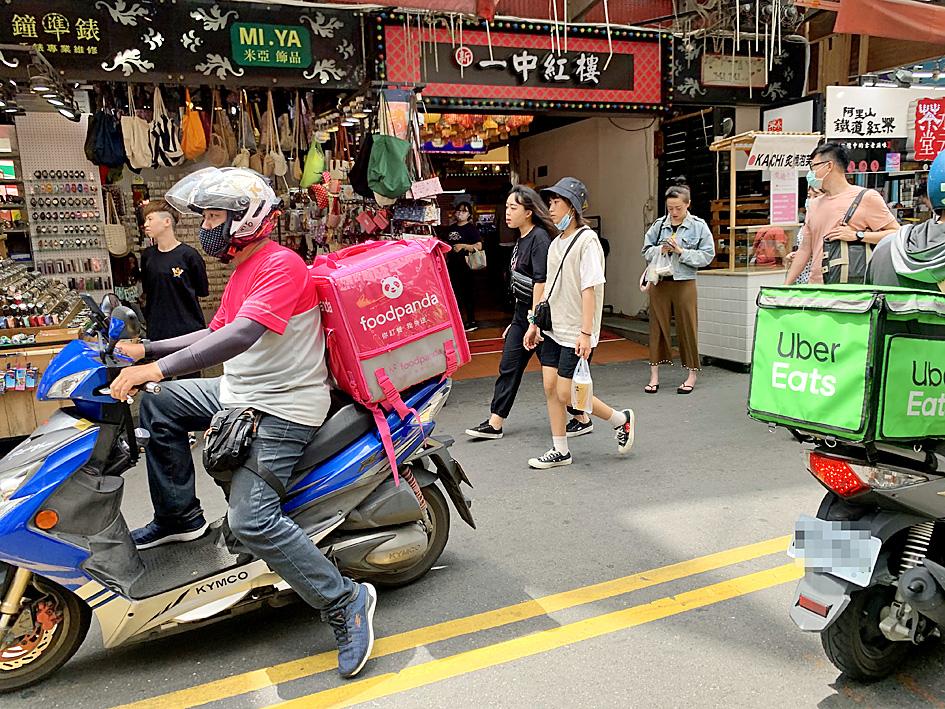Food delivery provider Foodpanda had 564 consumer disputes from January to last month and failed to attend many mediation sessions with local governments nationwide, the Executive Yuan’s Consumer Protection Committee said.
In a news release earlier this month, the committee said that it investigated consumer complaints and mediations for Foodpanda and rival Uber Eats during the period, when the number of delivery orders jumped due to the COVID-19 pandemic.
Uber Eats had 80 consumer disputes, the committee said.

Photo: Tsai Shu-yuan, Taipei Times
Of Foodpanda’s consumer disputes, 368 resulted from delivery drivers canceling orders after customers could not be reached, 108 were related to the quality or quantity of food, 41 concerned the service of delivery workers, 11 were about the ingredients of orders, eight were over prices and 28 concerned other issues, the committee said.
Of the Uber Eats disputes, 38 were linked to its Eats Pass promotional program — a NT$120 monthly subscription that allows orders of at least NT$199 without a delivery fee — with people complaining that the subscription renewed the next month without confirmation, it said.
Another 14 were due to order cancelations, nine were related to the quality or quantity of food, eight concerned the service of delivery workers and 11 were related to other issues, it said.
The frequency of Foodpanda’s absences from mediation sessions held by local governments was higher, which the firm attributed to strikes by delivery workers during the Lunar New Year holiday and a rising number of orders in the period, it said.
The committee urged the companies to participate in mediation to show that they care about consumers’ rights, as well as to comply with regulations.
Before placing an order, consumers can consult lists local governments publish online of corporations that have failed to attend mediation sessions without proper reasons, it said.
When a dispute arises, people can call the national consumer protection “1950” hotline, or file an online complaint on the committee’s Web site, it added.

CAUTION: Based on intelligence from the nation’s security agencies, MOFA has cautioned Taiwanese travelers about heightened safety risks in China-friendly countries The Ministry of Foreign Affairs (MOFA) yesterday urged Taiwanese to be aware of their safety when traveling abroad, especially in countries that are friendly to China. China in June last year issued 22 guidelines that allow its courts to try in absentia and sentence to death so-called “diehard” Taiwanese independence activists, even though Chinese courts have no jurisdiction in Taiwan. Late last month, a senior Chinese official gave closed-door instructions to state security units to implement the guidelines in countries friendly to China, a government memo and a senior Taiwan security official said, based on information gathered by Taiwan’s intelligence agency. The

The National Immigration Agency (NIA) said yesterday that it will revoke the dependent-based residence permit of a Chinese social media influencer who reportedly “openly advocated for [China’s] unification through military force” with Taiwan. The Chinese national, identified by her surname Liu (劉), will have her residence permit revoked in accordance with Article 14 of the “Measures for the permission of family- based residence, long-term residence and settlement of people from the Mainland Area in the Taiwan Area,” the NIA said in a news release. The agency explained it received reports that Liu made “unifying Taiwan through military force” statements on her online

Taiwan Semiconductor Manufacturing Co (TSMC), the world’s largest contract chipmaker, said yesterday that it is looking to hire 8,000 people this year, at a time when the tech giant is expanding production capacity to maintain its lead over competitors. To attract talent, TSMC would launch a large-scale recruitment campaign on campuses across Taiwan, where a newly recruited engineer with a master’s degree could expect to receive an average salary of NT$2.2 million (US$60,912), which is much higher than the 2023 national average of NT$709,000 for those in the same category, according to government statistics. TSMC, which accounted for more than 60 percent

Tung Tzu-hsien (童子賢), a Taiwanese businessman and deputy convener of the nation’s National Climate Change Committee, said yesterday that “electrical power is national power” and nuclear energy is “very important to Taiwan.” Tung made the remarks, suggesting that his views do not align with the country’s current official policy of phasing out nuclear energy, at a forum organized by the Taiwan People’s Party titled “Challenges and Prospects of Taiwan’s AI Industry and Energy Policy.” “Taiwan is currently pursuing industries with high added- value and is developing vigorously, and this all requires electricity,” said the chairman